Related Research Articles

The Second Boer War, also known as the Boer War, Transvaal War, Anglo–Boer War, or South African War, was a conflict fought between the British Empire and the two Boer republics over the Empire's influence in Southern Africa.

The siege of Ladysmith was a protracted engagement in the Second Boer War, taking place between 2 November 1899 and 28 February 1900 at Ladysmith, Natal.

The Queen's South Africa Medal is a British campaign medal awarded to British and Colonial military personnel, and to civilians employed in an official capacity, who served in the Second Boer War in South Africa. Altogether twenty-six clasps were awarded, to indicate participation in particular actions and campaigns.
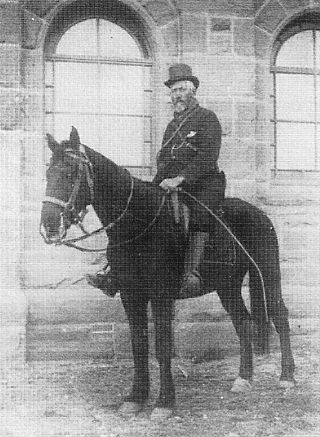
Christoffel Cornelis Froneman, commonly known as Stoffel Froneman, was veldkornet, general and Vice-Commander-in-Chief of the Orange Free State Boer forces during the Anglo-Boer War of 1899-1902.
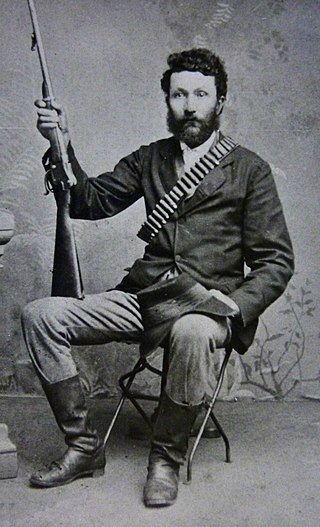
Stephanus Petrus Erasmus Trichard was a field cornet and Commander for the South African Republic in the First and Second Boer War.

Jan Hendrik Olivier was a Boer general during the Second Boer War who was notable for being the main Boer commander at the Battle of Stormberg.
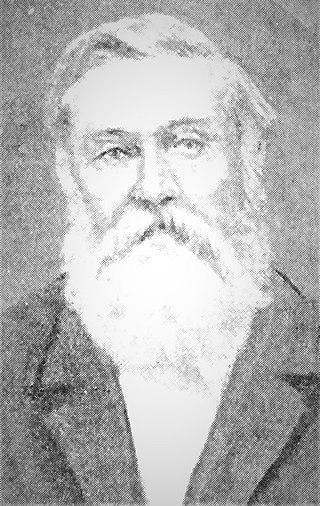
Marthinus Prinsloo was an Orange Free State Boer farmer, politician and general in the Second Boer War (1899-1902). He was born of Nicolaas Frans Prinsloo and Isabella Johanna Petronella Rautenbach in the district of Graaff-Reinet, South Africa who migrated to the Orange Free State where they lived in Bloemfontein, Waterval and Bethlehem. Marthinus Prinsloo was the eldest brother of Orange Free State assistant chief commander Antonie Michael Prinsloo.
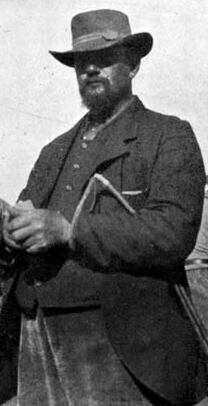
Pieter Daniël de Wet was a Boer general in the Anglo-Boer War (1899–1902) and a younger brother of Boer general and politician Christiaan de Wet. Piet de Wet participated in the Battle of Poplar Grove, the Battle of Sanna's Post for the waterworks there, and defeated the 13th Battalion Imperial Yeomanry at Lindley. In July 1900, he surrendered to the British at Kroonstad, Orange Free State. He became a prominent member of the National Scouts helping the British in the last years of the Boer War.

Christiaan Botha was a younger brother of Louis Botha (1862–1919) and Philip Botha (1851-1901), but an older brother of Theunis Jacobus Botha (1867-1930), and likewise a Boer general in the Second Boer War (1899–1902) who then both fought the British to the end.

Petrus Johannes Liebenberg was a South African Boer politician for Potchefstroom and a general in the Anglo-Boer War (1899–1902). He successfully invaded the Cape Colony, failed to prevent the British relief of Mafeking, and fought to the end up to the Battle of Rooiwal. During the First World War Liebenberg criticised the policy of the Botha government to attack German South West Africa but did not condone the Maritz rebellion.

Sarel François Oosthuizen, 22 March 1862 – 14 August 1900) was a Boer War general. In 1920 he was posthumously awarded the Dekoratie Voor Trouwe Dienst, Anglo-Boeroorlog, 1899-1902.
Petrus "Piet" Johannes Fourie was a Boer general for the Orange Free State in the Anglo-Boer War (1899–1902) in South Africa. He should not be confused with his Boer colleagues generals Joachim Christoffel Fourie (1845–1900) and Christiaan Ernst Fourie (1858–1943).
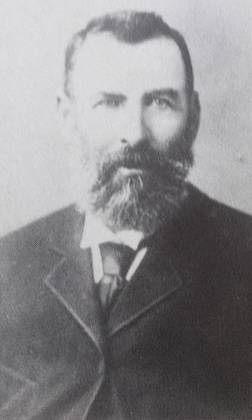
Ignatius "(Oom) Naas" Stephanus Ferreira was an Orange Free State Boer war general and Commander-in-Chief, who was fatally shot at the Battle of Paardeberg. Naas Ferreira should not be confused with his son and namesake Ignatius "Natie" Stephanus Ferreira, the gold miner Ignatius Philip Ferreira, and Boer general J. (Joachim) Ferreira.

Sarel Petrus du Toit was a Second Boer War Boer general for the South African Republic. In 1896 he was elected representative to the Eerste Volksraad in Pretoria for the district of Wolmaransstad.

Daniel Jacobus Elardus Erasmus was a Boer general during the Anglo Boer War (1899–1902).
Ferdinandus Jacobus Potgieter was a Boer general in the Second Boer War (1899–1902).
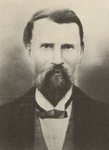
Frederik Jacobus Potgieter was a Boer commander in the Second Boer War. He is also referred to as Frederik Johannes Potgieter.

Tobias Smuts was a Second Boer War Boer general and member of the Eerste Volksraad for the South African Republic.
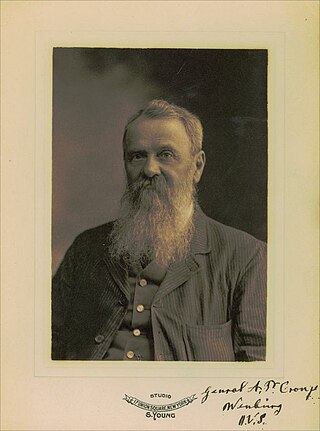
Andries Petrus Cronjé was a Second Boer War Boer general and a member of the Orange Free State Volksraad and the Orange River Colony parliament. He should not be confused with Boer general Andries Petrus Johannes Cronjé, who surrendered and cooperated with the British in the National Scouts.

The Battle of Veertien Strome was a military engagement in the Second Boer War fought near Warrenton, Northern Cape, by Boer troops under Sarel du Toit and British troops under Paul Methuen. Du Toit failed to prevent the British from crossing the Vaal River and entering the South African Republic from the southwest. This British move would be part of Methuen's clearing of the Orange Free State, within the overall military advance on Pretoria.
References
- ↑ Military Information Bureau SADF Information Bureau. "A short chronicle of warfare in South Africa. Compiled by the Military Information Bureau. From Scientia Militaria, South African Journal of Military Studies, Vol 16, Nr 3, 1986". pp. 40–57. Retrieved 20 July 2023.
Khoisan Wars. Khoisan is the collective name for the South African people known as Hottentots and Bushmen....The KhoiKhoi Wars. 1st Khoikhoi War (1659–1660)..
- ↑ Saks, DY (June 1995). "The South African Military History Society, Die Suid-Afrikaanse Krygshistoriese Vereniging, Military History Journal, Vol 10 No 1, June 1995 (incorporating Museum Review) - SKIRMISH AT ZWARTKOPPIES". samilitaryhistory.org. Retrieved 24 April 2023.
- 1 2 3 4 5 6 7 8 9 10 11 12 13 J. H. Breytenbach, Die Geskiedenis van die Tweede Vryheidsoorlog in Suid-Afrika, 1899–1902, Die Staatsdrukker Pretoria, 1969–1996. Volume I. Die Boere-offensief, Okt. - Nov. 1899, pp. 30-31, Die Staatsdrukker Pretoria, 1969. In Afrikaans.
- ↑ Rademeyer, Jacobus Ignatius. "Die Oorlog teen Magato (M'pefu) 1898" (PDF). repository.up.ac.za (in Afrikaans). M. A. dissertation, University of Pretoria. Retrieved 24 April 2023.
- ↑ For Afrikaans language designations of battles: Breytenbach, J. H. Die Geskiedenis van die Tweede Vryheidsoorlog in Suid-Afrika, 1899-1902, Die Staatsdrukker Pretoria, 1969-1996, six volumes
- ↑ "Battle of Graspan". britishbattles.com. 2023. Retrieved 28 June 2023.
The battle (also known as the Battle of Enslin) fought on 25th November 1899 in the Great Boer War by Lord Methuen, leading to the British advance to the disastrous battles of Modder River and Magersfontein
- ↑ Thomas Pakenham, The Boer War, George Weidenfeld & Nicolson, London, 1979. Abacus, 1992. ISBN 0 349 10466 2. Pages 188-189 and 192-193.
- ↑ Conan Doyle, A.C. (1902). "The Great Boer War, London, Smith, Elder & Co., 1902. CHAPTER XX Roberts' Advance on Bloemfontein". pinetreeweb.com. Smith, Elder & Co. Archived from the original on 10 February 2007. Retrieved 30 April 2023.
- ↑ Rickard, John (2 March 2007). "Battle of Driefontein, 10 March 1900". historyofwar.org. Military History Encyclopedia on the Web. Retrieved 30 April 2023.
- ↑ Killingray, David (2012). "Chapter 8. The War in Africa (pages 112-126)". In Horne, John (ed.). A Companion to World War I. John Wiley & Sons. p. 119.